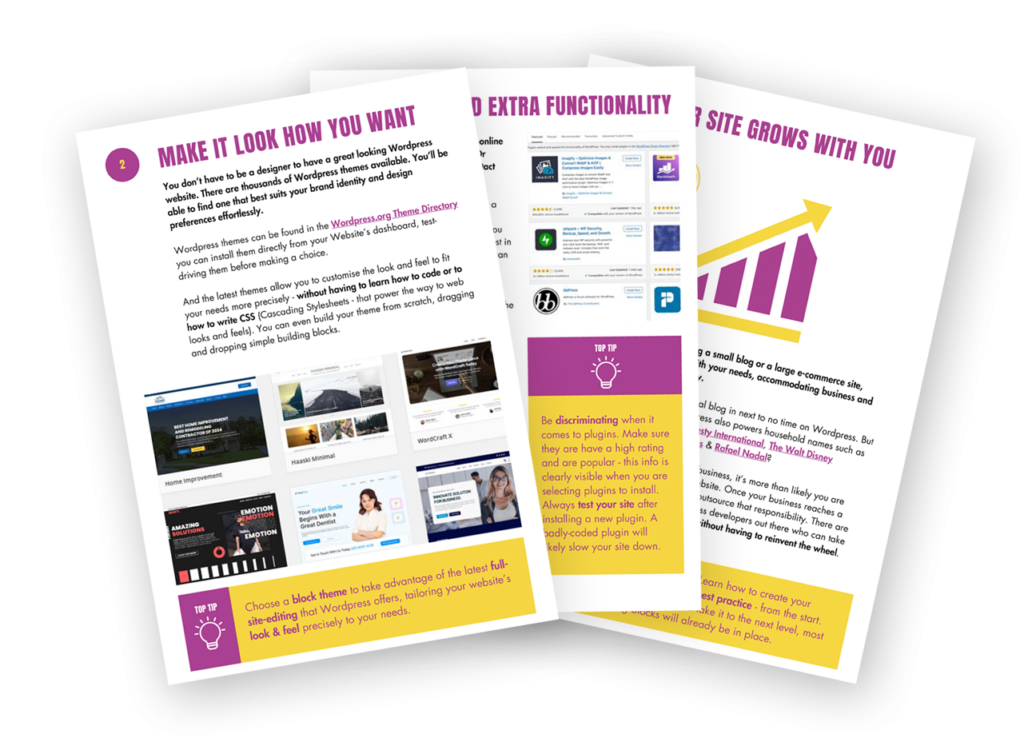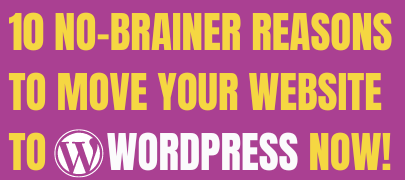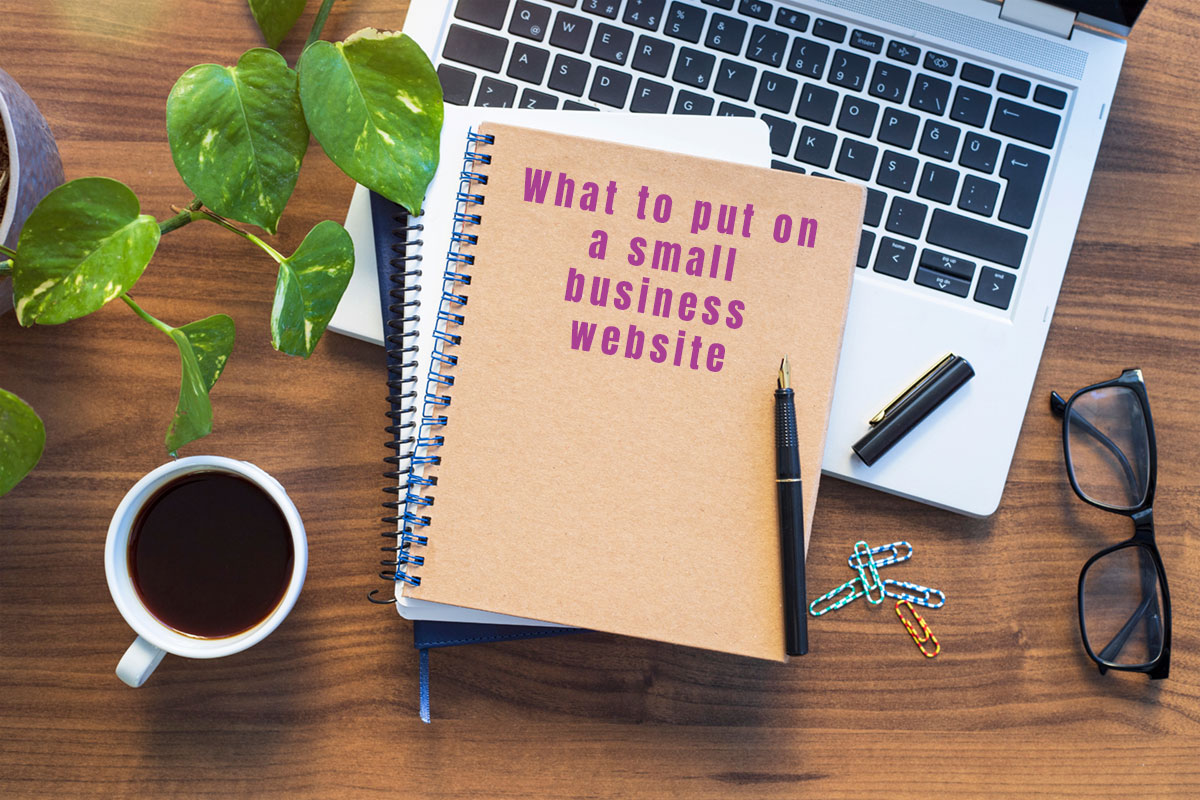When you’re starting out with WordPress, one of the first questions you’re likely to have is: How much is this actually going to cost me? The good news is that WordPress is incredibly flexible – whether you’re working on a shoestring budget or have some funds to invest, there are decent options for you.
I’ll break it down for you step by step to help you plan.
- Can I run a WordPress website cost-free?
- Why does open source matter?
- Plugins & themes: free vs paid
- What about web hosting?
- 3rd-party tools & integrations
- How does WordPress compare to the cost of Wix and Squarespace?
- Do you need to hire a web developer?
- The bottom line: how much does WordPress cost to run?
- Final thoughts: take control of your WordPress website
Can I run a WordPress website cost-free?
Yes, but no…
Let me explain.
WordPress itself is free to download and use. It’s open-source software, which means a global community of volunteer developers work on it, making it accessible to everyone for free. But while WordPress itself is free, there are some essential associated costs you’ll need to weigh up before your site can go live.
Web Hosting and a Domain Name
Here’s the catch: running a website requires web hosting (we’ll get to that in a moment), and you will also need a domain name – your web address. These two things alone mean you’ll need to spend a little. If you are serious about creating a professional business website, these small investments are worth it.
Why does open source matter?
The fact that WordPress is open source is a big deal. Unlike subscription-based platforms like Wix or Squarespace, you own your WordPress site and have complete control over it. If you’re on one of these subscription-based services, check your terms and conditions – they own your website and licence it’s usage to you for the length of your subscription. Cancel and it and you say goodbye to your website.
With WordPress, you’re not locked into one company’s commercial ecosystem, so you can take your website wherever you like. I’ve written an entire post about why you should choose WordPress over subscription-based alternatives.
Open source also means there are thousands of free plugins, themes and resources available to help you customise your site without spending a fortune. Speaking of plugins and themes…
Plugins & themes: free vs paid
One of WordPress’s key strengths is its ability to expand functionality using plugins and get full control over your design and layout with themes.
There are plenty of free plugins and themes available – many of which are brilliant for beginners.
3 free plugins I’d recommend without hesitation:
- Yoast SEO – an essential free plugin for getting your website found on Google
- WP Forms – for easily build contact forms for your site
- Independent Analytics – GDPR compliant plugin that will give you invaluable insights into your visitors – all within the WordPress admin
When you are choosing a theme – the watchwords lightweight and fast. I would recommend a theme that’s compatible with the block editor – the built-in page builder that ships with WordPress. I’m not a fan of third party page builders such as Elementor. In my opinion, they add unnecessary complexity and can slow down your site.
While many free tools work well, paid options can offer additional features and support. For instance. Whilst I don’t like page builder plugins, I really do like lightning fast premium themes that support full site editing. GeneratePress’s pro theme, for example, costs $59 per year and unlocks advanced design and customisation features.
What about web hosting?
Web hosting is non-negotiable: it’s where your website lives online. Prices do vary a great deal however. I’d argue that it’s one area where cost should not be your first consideration. It’s vital that your site loads quickly, is backed up regularly and is secure. I’d also recommend opting for hosting that specialises in WordPress – it will just make your life so much easier.
If you’re just starting out, I recommend an affordable managed WordPress hosting plan – managed means that your hosting provider takes care of all the technical “under-the-bonnet” stuff on your behalf – security, backups, caching (which ensure your site loads quickly). For detailed recommendations, check out my blog post: How do I choose the right WordPress web hosting provider?
TOP TIP
Siteground currently have an excellent introductory offer for the first 12 months – £1.99 per month – rising to £13.99 per month from then on. Offers such as these take the edge off your costs for the first year whilst you’re getting your site off the ground.
3rd-party tools & integrations
As your website grows, you might want to use 3rd-party tools to extend its functionality Some of these offer free starter plans, but typically these will incur costs sooner rather than later. For instance:
- Email marketing services like Brevo (formerly Sendinblue) offer free plans but may require upgrades as your list grows. You can read more about that on my post about collecting emails and grow your mailing list using WordPress
- Payment processors like Stripe or PayPal typically charge transaction fees (e.g., 2.9% + £0.30 per transaction).
- Tools for booking systems, advanced analytics, or CRM integrations often come with additional costs.
The key is to start simple and only pay for what you truly need right now. You can always upgrade as and when you need it.
FULL DISCLOSURE: I am an affiliate for Brevo, so if you sign up after clicking on the link, I’ll earn a few pennies. However, I only ever recommend products that I use and genuinely really like. I’d never promote anything purely because of the financial incentive.
Like this post? Why not subscribe for FREE?
A new blog post each week…plus weekly help, guidance and support direct to your inbox…
How does WordPress compare to the cost of Wix and Squarespace?
Platforms like Wix and Squarespace have upfront pricing, which can seem attractive because hosting, design, and basic functionality are bundled together.
For example:
- Wix starts at around £9 per month for basic plans.
- Squarespace plans begin at around £15 per month.
While these platforms are beginner-friendly, they can become expensive as you scale. Plus, you’re locked into their ecosystems – as I mentioned earlier, and cannot stress enough: they own your website and licence its usage back to you for the length of your contract / subscription. If you ever want to move your website away from these platforms, you’ll have to start from scratch.
WordPress, by comparison, gives you control and flexibility. And even with hosting and a few premium tools, the total cost of WordPress is often lower than these subscription-based models.
Do you need to hire a web developer?
For most non-techies, hiring a developer feels like a must—but it doesn’t have to be that way! One of the things I love about WordPress is that it’s accessible for beginners, especially when you have the right guidance.
I am developing a step-by-step methodology which will take you from overwhelmed novice to someone who can confidently build and manage their own website all without writing a single line of code – or paying a developer! If you need help in the meantime, my WordPress Health Check offers you affordable, expert support.
The bottom line: how much does WordPress cost to run?
Here’s a rough breakdown of possible annual costs of a WordPress website:
- Hosting: £50-£170
- Domain Name: £10-£20
- Themes and Plugins: Free to £200+
- Third-Party Tools: £0-£200 (depending on your needs)
Total: Anywhere from £60 to £500+ per year.
That’s a lot of flexibility! If you take the right approach, WordPress can be as budget-friendly or as feature-rich as you need it to be.
Final thoughts: take control of your WordPress website
If the costs and options feel overwhelming, don’t worry – you’re not alone. My goal is to help non-techies like you feel confident managing your WordPress site without stress. Hopefully this post has alleviated some of those worries. Please join my FREE Facebook group for more help, guidance and support.





